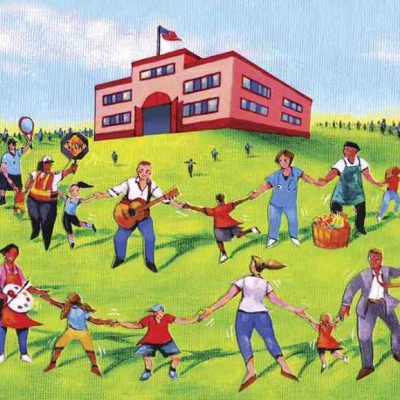Money shouldn’t be a taboo subject
It was third period on a Friday morning in the middle of December when my 7th-grade geography class had to do presentations on wealth inequality in the different areas of Boston. Third period is right before lunch, so the class was chatty as always. This time, however, the topic of discussion was last-minute details that we had to put into our presentations. It was hard to think straight, the nerves of having to go up in front of the class combined with the constant chatter made it impossible to get anything done. My group tried to get as much done in those eight minutes before presentations, not having prepared enough the night before.
My group was the first to present. We went up to the whiteboard where the slides were projected; our location of choice was Roxbury. Our slide presentation showed pictures of three-story condos, apartment buildings, and several areas that were slightly run-down with many houses packed together, along with some information about the average income of families living in Roxbury. After our five minutes were up, we rushed back to our desks, and our nerves were gone because the spotlight was no longer on us. Before the next group went up, my teacher took a poll, “Raise your hand if you live in Roxbury.” Roughly 10 hands went up, and this automatically made me terrified. If she was going to ask this after every neighborhood, I was starting to think that I would be the only one raising my hand for living in Jamaica Plain.
The presentations for Dorchester, East Boston, and Brighton were similar to ours, with the same types of houses and streets being shown, as well as almost identical data for average income. At that point, almost everybody had raised their hands to say that they lived in one of those areas. I was dreading the next presentation, Jamaica Plain, my neighborhood. The slideshow was filled with very large and expensive-looking houses with many floors and huge yards. One of the pictures was of a house on my street that had at least 5 floors. Granted, I think that two or three families live in the house, but nonetheless, these houses represented Jamaica Plain, and my house looked a lot like some of them.
I never really noticed the drastic difference between houses in my neighborhood and the neighborhoods of my classmates. I was embarrassed, and dreaded raising my hand for the poll at the end of the presentation. I could feel my face heat up as I was one of two to raise my hand. My friends looked at me like I had three heads, and I just wanted to sink into my chair and disappear. When the bell rang I rushed out the door, and could only hope that my friends wouldn’t question me during lunch.
I live in a three-story house with a big backyard, and just by looking at it, you can tell that it is expensive. The summer before 7th grade was when we bought the house. I went from sharing a small room with my brother in a two-bedroom, one-bathroom condo to having my own room and plenty of space to do what I wanted. I always knew that my family wasn’t bad off; we weren’t the stereotypical rich family with vacation homes and boats, but we had the money to have fun experiences. This never really mattered among friendships until I came to a new school. At my old school, most families were like mine, decently wealthy but not with plenty of money to spare. We also never discussed money at school because we were taught that it was taboo.
This project at a brand new school was the first time I had a discussion about money, and the fact that having more or less money can truly affect how someone lives. I was embarrassed that I lived in the “rich neighborhood.” That evening, I couldn’t get the situation out of my head. I was embarrassed that my parents had money and that I lived in a big house, but I told myself that I did not choose my situation. My parents didn’t come from rich families — they worked really hard to be able to afford the things that we have, and I should be proud of them and their determination. Seeing them change their situation, and make a good life for themselves has been a privilege and has made me more humble. That day, I decided that I should no longer be embarrassed by my situation.
Having this discussion about money in school opened my eyes to how wealth can blind people to the struggles that so many others face. We are always taught that money is a taboo subject and that you don’t talk about it, but I think that talking about money can introduce you to a different perspective that you hadn’t considered before. It might be embarrassing and weird at first, but it gets better over time.
I thought that my friends would confront me that day for living in a rich neighborhood, but I had no reason to be worried about that. We talked about presentations that day, and the place I lived never came up once. Over the years at this new school, my friends and I, along with our classes, have had many discussions on how wealth can impact the lives of others. While I have no experience in this first-hand, I always find some way to contribute. I can now have good conversations with my close friends about how money impacts our lives. Because of the COVID-19 pandemic, it is more important than ever to talk about how people are struggling to get by, and how we can help them. If I hadn’t gotten embarrassed about where I lived, then I would have never been able to get over that subconscious ignorance that I had towards the topic of money, and I wouldn’t be so open to helping others today.










